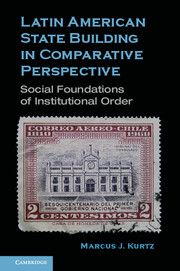Book contents
- Frontmatter
- Contents
- Acknowledgments
- 1 The Difficulties of Studying State Building
- 2 The Social Foundations of State Building in the Contemporary Era
- 3 State Formation in Chile and Peru
- 4 State Formation in Argentina and Uruguay
- 5 Divergence Reinforced
- 6 The Social Question and the State
- 7 Conclusions, Implications, and Extensions
- References
- Index
5 - Divergence Reinforced
The Timing of Political Inclusion and State Strength in Chile and Peru
Published online by Cambridge University Press: 05 February 2013
- Frontmatter
- Contents
- Acknowledgments
- 1 The Difficulties of Studying State Building
- 2 The Social Foundations of State Building in the Contemporary Era
- 3 State Formation in Chile and Peru
- 4 State Formation in Argentina and Uruguay
- 5 Divergence Reinforced
- 6 The Social Question and the State
- 7 Conclusions, Implications, and Extensions
- References
- Index
Summary
We saw in Chapter 3 that Chile and Peru represented polar outcomes with regard to their initial state-building trajectories. But this represented only the first of two critical steps in the theory of long-run state building developed in this book. In this chapter, we consider the second major branching point in institutional development – the fashion in which the inclusion of middle-class and working-class actors as important players in national politics is structured. This is a sequenced claim, and outcomes depend on the interaction with the preexisting paths of political development on which each country had already been launched. It is only after this second critical juncture, coming around the time of the Great Depression in most of Latin America, that trajectories are most firmly established. The outcomes in Chile and Peru explored in this chapter are here again polar with respect to institutional development. Indeed, the second critical juncture in these cases reinforced and deepened the preexisting trajectories of political development: while the ultimate accommodation of the social question in Chile led to a further and dramatic expansion and strengthening of state institutions, precocious political incorporation in Peru only heightened the underdeveloped character of the public administration and locked in an infelicitous trajectory for decades to come.
In Chile, already possessing some of the most well-founded institutions on the continent, the entry of the masses into electoral politics came quite late – in large part after the start of the Great Depression and, for some, long thereafter. In a process that we see as well in the Uruguayan case (Chap-ter 6), what instead occurred was a development of institutions designed to accommodate mass economic and political mobilization well in advance of the reality of such autonomous large-scale participation. This had the effect of ultimately channeling political participation – when suffrage was finally extended to new groups – in ways that served to strengthen and expand these institutions rather than pose insurmountable challenges to them. By contrast, in Peru, mass participation came quite early, before solid institutions existed and in a political–economic context far less favorable to the use of the state to accommodate emergent middle-sector and working-class political demands. The consequence was a highly polarized politics, a weakened state, and the inability to construct any sort of viable, penetrating, or lasting administrative structure under democratic or authoritarian auspices alike.
- Type
- Chapter
- Information
- Latin American State Building in Comparative PerspectiveSocial Foundations of Institutional Order, pp. 131 - 175Publisher: Cambridge University PressPrint publication year: 2013



